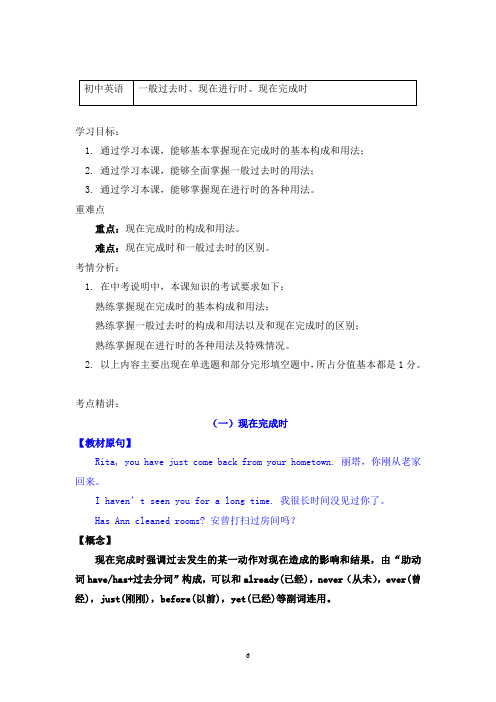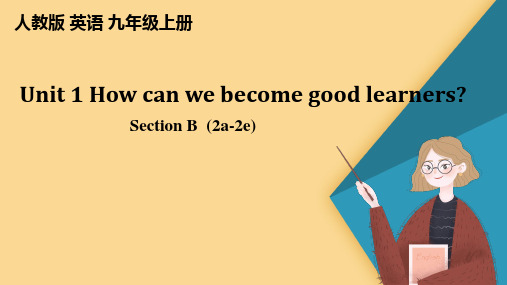九年级英语上册 Review of Unit 1-2词句精讲精练 (新版)仁爱版
【配套K12]七年级英语下册 Review of Units 5-6词句精讲精练 (新版)仁爱版
![【配套K12]七年级英语下册 Review of Units 5-6词句精讲精练 (新版)仁爱版](https://img.taocdn.com/s3/m/2d7dbde050e2524de5187e98.png)
Review of Units 5-6词句精讲精练词汇精讲1. talktalk意为“谈话”,当talk作此意讲时,不强调内容,一般指说的动作,其后常接介词to 和with,表示“与……谈话”;接介词about时表示“谈论……”。
例如:Jimmy and Bill often talk about computer games.吉米和比尔经常谈论电脑游戏。
Mary is talking with Mr. Green in English.玛丽正在用英语和格林先生交谈。
【拓展】辨析:speak、say和tell(1)speak一词强调说话的能力、对象和方式。
用作及物动词时后接表示语言的名词作宾语;用作不及物动词时,后接介词to,表示“与……讲话”,一般用于打电话用语中或较正式的情况下。
例如:They can speak Chinese. 他们会说中文。
May I speak to Mr. Black? 请问,我能和布莱克先生讲话吗?(2)say用作及物动词,强调说的内容。
若指“对某人说”用say to sb.来表示。
例如:Can you say it in English? 你能用英语说它吗?(3)tell经常作及物动词,意为“讲述,告诉”,后常接双宾语,侧重把一件事情传达给别人。
常用结构是tell sb. to do sth. 意为“告诉某人做某事”,其否定形式为tell sb. not to do sth.,意为“告诉某人不要做某事”,tell sb. about sth. 意为“告诉某人关于某事”。
例如:My mother tells me to get up early. 我妈妈告诉我早点起床。
2. makemake作使役动词,后接省略to的动词不定式,即:make sb. do sth. 意为“使/让某人做某事”,类似的动词还有let,have等。
例如:The boss made them work for long time.老板让他们长时间工作。
仁爱版英语九年级上册知识讲义-一般过去时、现在进行时、现在完成时-

学习目标:1. 通过学习本课,能够基本掌握现在完成时的基本构成和用法;2. 通过学习本课,能够全面掌握一般过去时的用法;3. 通过学习本课,能够掌握现在进行时的各种用法。
重难点重点:现在完成时的构成和用法。
难点:现在完成时和一般过去时的区别。
考情分析:1. 在中考说明中,本课知识的考试要求如下:熟练掌握现在完成时的基本构成和用法;熟练掌握一般过去时的构成和用法以及和现在完成时的区别;熟练掌握现在进行时的各种用法及特殊情况。
2. 以上内容主要出现在单选题和部分完形填空题中,所占分值基本都是1分。
考点精讲:(一)现在完成时【教材原句】Rita, you have just come back from your hometown. 丽塔,你刚从老家回来。
I haven’t seen you for a long time. 我很长时间没见过你了。
Has Ann cleaned rooms? 安曾打扫过房间吗?【概念】现在完成时强调过去发生的某一动作对现在造成的影响和结果,由“助动词have/has+过去分词”构成,可以和already(已经),never(从未),ever(曾经),just(刚刚),before(以前),yet(已经)等副词连用。
1. 现在完成时强调过去发生的某一动作对现在造成的影响和结果。
—Have you found him yet ? 你已经找到他了吗?—No, he has probably gone home. 不,他大概已经回家了。
(现在不在这里)2. 现在完成时也可表示开始于过去并持续到现在的动作或状态,可以和表示从过去某一时刻延续到现在(包括“现在”在内)的一段时间的状语连用。
表示持续动作或状态的动词多是延续性动词。
I haven’t seen her these days. 我这些天没有看见过他。
He has taught us since I came to this school. 自从我来到这所学校,他一直教我们。
初中英语阅读理解九年级(全) Units 1~2

词汇语境运用 栏目索引
二、用方框中所给词的适当形式填空 wise lie lay admire attention create connect aloud pБайду номын сангаасt shoot
1.My mother laid out some grapes on the table, and then she asked us to eat them. 2.He has put on weight since I last saw him in the street. 3.I kept trying to attract the waiter's attention ,but he didn't notice me. 4.The teacher taught us how to use the Internet wisely in our study. 5.The man lifted the gun and shot down a bird in the tree.
熟词生义讲练
熟词生义讲练 栏目索引
1.sentence (n.)句子 (v.)判决;宣判 如:to be sentenced to death/three years in prison被判死刑/三年徒刑 2.patient (n.)病人 (adj.)有耐心的→patience(n.)忍耐力;耐心 ★be patient with对……有耐心
必备知识梳理 栏目索引
9. have a better understanding of 对……有更好的理解 10. take notes 记笔记 11. make mistakes 犯错;出错 12. learning habits 学习习惯 13. have...in common 有共同之处 14. pay attention to 注意 15. be born with 天生具有 16. connect...with... 把……和……联系起来 17. write down 记下;写下
人教版九年级英语上册Unit2 单元复习课件二

19. 最终成为;最后处于 end up
20. 关心;在意
care about
21. 使某人想起
remind sb. of
22. 过去常常做某事
used to do sth.
23. 叫醒;醒来
wake up
24. 在危难中;在穷困中 in need
25. ……的开始
the beginning of...
8. He _____sh__o_t ____ (shoot) down an apple on the tree with a stone just now.
9. The story is so __to_u_c_h_i_n_g_ (touch) that I want to read it again.
R·九年级上册
Review of Unit 2
自学指导
Recite the important words and phrases.
stranger n. 陌生人 relative n. 亲属;亲戚 pound n. 磅(重量单位);英镑(英国货币单位)
steal v. 偷;窃取 lay v. 放置;安放;产(卵);下(蛋)
6. It’s a __t_r_a_d_it_io_n___ (traditional) to eat mooncakes on Mid-Autumn Festival in China.
7. Look! The man ___i_s_t_y_in__g___ (tie) the red horse to the tree.
business punish warn present warmth spread
n. 生意;商业 v. 处罚;惩罚 v. 警告;告诫 n. 现在;礼物 adj. 现在的 n. 温暖;暖和 v .传播;展开 n. 蔓延;传播
九年级英语Unit1Section B 2a-2e

try to find out the answers. Knowledge comes from questioning. Learning is a lifelong journey because every day brings something new. Everything that you learn becomes a part of you and changes you, so learn wisely and learn well.
Connect what they need to learn with something interesting.
Example?
They need to learn English and they like music or sports.
so
so They can listen to English songs or
出处 Para.1“But whether or not you can do … depends on your learning habits.”
2. How can a sports lover learn English? A. By listening to English songs to learn English. B. By watching sports programs in English. C. By joining more sports clubs. D. By memorizing more words about sports.
I can’t pronounce some of the words.
I think you can ask the teacher or classmates for help. Listening to the tapes and repeating may help you a lot.
九年级英语下册 Unit 6 Topic 1 I would rather watch sports shows than those ones讲义 (新版)仁爱版

Unit6 Topic1一重点单词actress ,educational ,science ,fiction,comedy,ending,drawing,adventure,mysterious,Award,motio n,director,general,footstep,talented,coach,formally,organize,advance,therefore,violence,violent1)actress(n) ----- act(v) ----- actor(n)2)educational(adj) ----- education (n)3)ending(n) ----- end (v,n)4)drawing(n) ----- draw (v)5)motion (n) ------move (v)6)director(n) ------direct(adj)----directly(adv)7)general(adj) ------generally(adv)8)formally(adv) -------formal(adj)9)organize(n) -------organization(n)10)violent(adj) -------violence(n)二词组1)Section Awould rather.....than... 宁愿做……而不愿做……play Chinese chess 下中国象棋Sports show 体育节目World tour 环球旅游Magic show 魔术表演News reports 新闻报道Educational programs 教育节目Animal world 动物世界with a sad ending 以悲剧结尾2)Section Bin a tired voice 用一种疲惫的声音in surprise 惊讶science fiction 科幻电影be mentioned 被提到be shown 上映be base on 以……为依据test one’s idea 验证某人的想法refer to 涉及到3)Section Cthree piece of news 三条新闻a list of winners 获奖者名单win the award 赢得奖项general review of ……的总结follow one’s footsteps 继承。
八年级英语下册《Review of Units 5-6》词句精讲精练 (新版)仁爱版-(新版)仁爱版
Review of Units 5-6词句精讲精练词汇精讲1. also, too&eitheralso; too与either都有“也”的意思,但用法不同:(1)also用于肯定句,位置通常位于句中,比too更为正式。
例如:I also go to work by bike. 我也骑自行车上班。
(2)too用于肯定句且置于句末,其前用逗号隔开;在简略答语中too常置于代词的宾格形式之后。
例如:— Tom likes music and Mary does, too. 汤姆喜欢音乐,玛丽也喜欢。
— Me, too. 我也是。
Jack is a worker, too. Jack也是工人。
(3)either用于否定句且置于句末,其前用逗号隔开。
例如:He can’t swim. I can’t swim, either. 他不会游泳,我也不会。
2. though&although(1)用作连词,表示“虽然”,二者可以互换使用,但although比though更为正式。
例如:Though/Although it was raining, we still went there. 虽然下着雨,但我们还是去了那里。
(2)although一般不用作副词,而though可用作副词,且一般放在句末(不放在句首),意为“可是,不过”。
例如:It’s hard work; I enjoy it, though. 工作很辛苦,可是我很喜欢。
We all tried our best. We lost the game, though. 我们都尽力最大努力,但我们还是输了。
(3)在as though(好像,仿佛),even though(即使,纵然)等固定短语中不能用although。
例如: He talks as though he knew everything. 他夸夸其谈,好像无所不知。
3. proudproud 是形容词,常用结构:be proud of sth. 意为“以……而骄傲”。
仁爱版七年级英语上册ReviewofUnits1_2综合习题测试含答案
Review of Units 1-2巩固练习I. 单项选择。
(每小题1分,共15分)1. — ____ are you?—I’m twelve.A. HowB. How oldC. WhatD. Who2. — Is that__________ orange ?— Yes, it isA. aB. anC. theD./3. — What class is Li Ming in?—She’s in _________.A. Class 2, Grade 1B. Grade 1, Class 2C. class 2, grade 1D. grade 1, class 24. —What color is the T-shirt?—It’s_________.A. an orangeB. orangeC. a pinkD. in green5. Miss Fang is ______ English teacher. _________ is a good teacher.A. our, HerB. my, HeC. a, SheD. an, She6. —What’re those?— _________ are flowers.A. ItB. TheseC. TheyD. That7. — Is this your bag?— _________.A. Yes, it isB. Yes, it’s a big.C. It’s my bagD. It isn’t8. —_________ is that boy?—He’s my friend.A. WhatB. WhoC. WhereD. How old9. Lucy_________ a short nose, but I _________ a long one.A. have, haveB. have, hasC. has, haveD. has, has10. They _________ from France.A. comesB. isC. areD. am11. _________, are you Mr Huang?A. PleaseB. Excuse meC. Hello,D. Sorry12. — How do you spell it?— _______.A. Yes, F-A-X fax.B. No, F-A-X fax.C. F-A-X fax.D. It’s a fax.13.— Who is she?—She’s my mother’s ________, my aunt.A. daughterB. auntC. motherD. sister14.—Would you like __________ orange juice? —No, thanks. There is __________ in my bottle.A. some, someB. any, anyC. some, anyD. any, some15. —Your pencil box is very nice.—__________.A. That’s rightB. You’re welcomeC. Thank youII. 完形填空。
仁爱版九年级英语教学案(Unit-1)
Unit 1 The Changing WorldTopic1 Great changes have taken place there.Section A 第 1 课时班级:_____________ 姓名:______________ 号数:_______________Aims and demands学习目标:1. 学习新单词: proper, by the way, bell, grandpa, chairwoman, grandson2. 学会区别have been to 与have gone to学习重点及难点:了解并掌握现在完成时的基本用法。
学习过程:Step 1. 导入。
Step 2. 自学检测:自学第1和第2页的内容,并写出下列英语。
1.变化的世界_________________2. .巨大的变化______________________3.越来越漂亮______________ 4.. 如此(那么)多的人___________________ 5. 拍照__________________Step3. 精讲点拨:1. 语法重点导入(根据句意在横线上填入谓语动词的适当形式)(1). He ______________ (play) soccer on the playground now.(2). He ______________ (play) soccer on the playground yesterday.(3). He ______________ (play) soccer on the playground when I saw him yesterday.(4). He ______________ (play) soccer on the playground every day.(5). He ______________ (play) soccer on the playground tomorrow afternoon.(6). He ______________ (play) soccer on the playground for a long time.注意(6)句中的时间状语,看P118现在完成时讲解, 总结现在完成时用法总结:(1) 现在完成时的构成是---________________________ 看P140-142过去分词表。
英语九年级上册 口语与听力(Unit 1 The changing world - Topic 3 . )-导学案-仁爱版
初中英语口语与听力(Unit 1 The changing world - Topic 3 The world has changed for the better. )1. 能识别出句子中单词的重音、弱读、连读以及停顿。
2. 能借助语境克服生词障碍、理解听力大意。
重点:能针对所听语段的内容记录简单信息。
难点:能借助语境克服生词障碍、理解所听内容。
考点精讲:【听力课堂】听下面一段对话,回答第1至第2两个小题。
1. What does Mr. Wu usually do on Friday night?A. Watches movies.B. Watches TV.C. Surfs the Internet.2. What shows does Mr. Wu love best?A. Game shows.B. Talent shows.C. Talk shows.听力原文W: What do you usually do on Friday night, Mr. Wu?M: I usually go to the cinema and sometimes I watch TV at home.W: What kind of show do you usually watch? What do you think of game shows?M: I am not fond of them. I like talk shows best.W: I don’t think your wife loves talk shows.M: No, she doesn’t. She loves talent shows. So I watch talk shows with my son.答案:A C思路分析:1. 根据听力材料内容“我通常去看电影,有时在家看电视”可知,吴先生通常看电影,故选A。
2. 根据听力材料内容“因此我和儿子一起看谈话节目”可知,吴先生喜欢谈话节目,故选C。
- 1、下载文档前请自行甄别文档内容的完整性,平台不提供额外的编辑、内容补充、找答案等附加服务。
- 2、"仅部分预览"的文档,不可在线预览部分如存在完整性等问题,可反馈申请退款(可完整预览的文档不适用该条件!)。
- 3、如文档侵犯您的权益,请联系客服反馈,我们会尽快为您处理(人工客服工作时间:9:00-18:30)。
精选doc . Review of Unit 1-2 词句精讲精练 词汇精讲 1. take place (1) take place意为“举行,进行”。例如: The football game will take place tomorrow. 足球比赛明天举行。 (2) take place还有“发生;产生”之意。例如: Great changes have taken place in China. 中国已经发生了巨大的变化。 【拓展】 辨析:take place与happen (1) take place 表示“发生、举行、举办”,一般指非偶然性事件的“发生”,即这种事件的发生一定有某种原因或事先的安排。例如: When will the wedding take place? 婚礼什么时候举行?
(2) happen作“发生、碰巧”解,一般用于偶然或突发性事件。例如: What happened to you? 你发生了什么事?(一般不说:What did you happen?) 【注意】happen 与 take place 通常都没有被动语态。 2. population population意为“人口”时,是一个集体名词,被看作一个整体,在句中作主语时,后面的谓语动词用单数形式。例如:
China has a quarter of the world’s population. 中国人口占世界人口的四分之一。 【拓展】 (1) 当表示一个城市、地区或国家有多少人口时,常用以下两种结构,即“the population of + 某地 + is + 数词”或“某地 + has a population of + 数词”。例如:
The population of London is over ten million. =London has a population of over ten million. 伦敦的人口超过一千万。精选doc . (2) population可与large,small搭配,但不能与many,few搭配。例如: The city with its large population has become crowded. 这个人口众多的城市变得拥挤不堪了。 (3) 询问人口数量常用what或how large。例如: What’s the population of the city? =How large is the population of the city? 这个城市有多少人口? (4) population前有修饰词,如分数、百分数时,表示整体人口中的一部分,谓语动词有用复数形式。例如:
One half of the population of the city are farmers. 这个城市的一半人口是农民。 3. offer (1) offer是动词,意为“主动提供”。例如: They will offer drinks during the meeting. 会议期间他们将提供饮料。 The young man offered an old man his own seat.
= The young man offered his own seat to an old man. 那个年轻人把自己的座位让给了一位老人。 (2) offer的常见搭配: offer to do sth. 主动提出做某事 offer sb. sth. = offer sth. to sb. 向某人提供某物 例如: He offered me a glass of wine. 他端给我一杯酒。
4. satisfy (1) 作动词,意为“使满意,使高兴;使满足”。例如: That answer won’t satisfy her. 那个回答不能令她满意。 Our company will do everything to satisfy our customers. 我们公司将尽一切努力令顾客满意。 (2)作动词,意为“符合,达到(要求,标准等)”。例如: You can’t apply for the job until you have satisfied certain conditions. 精选doc . 符合某些条件前,你不能申请这个工作。 【拓展】 (1)satisfied 作形容词,意为“满意的”。常放在系动词后面作表语。例如: Her pride was so fully satisfied. 她的虚荣心得到了如此充分的满足。 She seemed pretty satisfied with the result. 她对那结果似乎相当满意。 I felt quite satisfied after my big meal。 这顿大餐,我吃得很满意。 (2)常用短语搭配:be satisfied with sth. 意为“对……很满意(主语为人)”。 例如: The teacher is satisfied with her homework. 老师对她的作业很满意。 I told myself I would be satisfied with whatever I could get. 我告诉自己,不管得到什么我都会心满意足的。 One shouldn’t be satisfied with only a little success. 一个人不应该只因一点小成就而感到满足. 5. success success 表示抽象意义的“成功”,是不可数名词;表示具体意义的“成功的人或事”, 则是可数名词。 例如: Failure is the mother of success. 失败是成功之母。 His new book was a great success. 他新出版的书获得了巨大成功。 【拓展】精选doc . (1)succeed 表示“成功”,是不及物动词;表示做某事成功了,succeed 后通常接(in)doing sth。 例如: His plan succeeded.他的计划成功了。 At last he succeeded in solving the problem. 他终于把那个问题解决了。 She succeeded in (passing) the exam. 她考试及格了。 (2)successful作形容词,意为“成功的”。例如: The performance was successful. 演出很成功。 It was a successful experiment. 那是一次成功的试验。 6. encourage encourage用作及物动词,意为“鼓励;鼓舞;促进;助长”等,常用于以下结构:encourage sb. to do sth.意为“鼓励某人做某事”。例如:
The teacher often encourages us to study hard.老师经常鼓励我们要努力学习。 My mother encouraged me to enter the contest. 妈妈鼓励我参加那场比赛。 【拓展】 (1) encourage sb. in sth. 意为“在……方面鼓励/助长某人”。例如: Don’t encourage him in laziness. 别助长他的懒惰行为。 (2) encouragement是encourage的名词形式,意为“鼓舞/鼓励”。例如: The teacher’s words were a great encouragement to him. 老师的话对他是极大的鼓舞。 7. pollute pollute为及物动词,意为“污染,弄脏”;pollution为pollute的名词形式,意为“污染”,是不可数名词。例如: We should not pollute our rivers with waste.
我们不应让废弃物污染我们的河川。 Pollution is a big problem. 污染是个大问题。精选doc . 【拓展】 含pollution的习惯用语:air pollution 空气污染 noise pollution 噪音污染 8. create create作动词,意为“创造,创作,创建”。例如: God creates human beings. 上帝创造了人类。 An artist should create beautiful things. 一个艺术家应该创造美丽的东西。 It is people who create history. 是人民创造了历史。 【拓展】 creative作形容词,意为“有创造性的,有创意的”。例如: Yoga releases the creative potential in life. 瑜伽释放出生命中创造的潜力。 Pay close attention to your own creative ideas. 时刻关注自己创造性的想法。 9. discover discover是动词,意为“发现”,其后可接名词、代词、疑问词+不定式及that从句等。例如: We never discovered how to open the box.
我们从未弄清楚如何打开这个盒子。 【拓展】 (1) discover意为“发现”,指有意或无意地发现已经存在尚不为人知的事物。例如: China has discovered oil under the South China Sea.
中国在南海发现了石油。 (2) find意为“找到、发现”,指偶然发现或经过一番寻找,找到值得或所需的东西,强调找的结果。例如: I found the book I was looking for. 我找到了一直在找的书。 (3) find out意为“查明白、弄清楚”,多用于经过调查、分析、研究等手段查出的情况,查出的东西往往是抽象的,如时间、事实、真相等。例如: Please find out when the meeting starts. 请查一下会议什么时候开始。 (4) invent意为“发明”指经过研究、设计而创造出原本未有的东西。例如: Cai Lun invented the paper. 蔡伦发明了纸。
